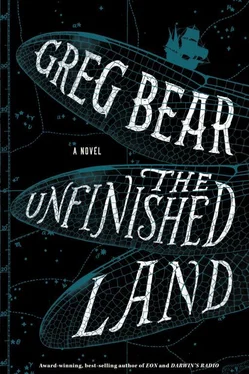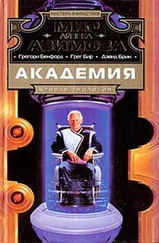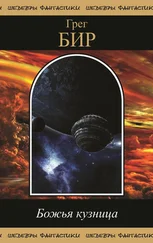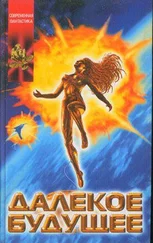“Well, it is certain that the Travelers have been uneasy,” Anutha said. “Many trods wither and fade. And year after year, less word from the Crafter cities.”
The Sister Queens held sway over regions that lay a thousand miles from Zodiako, if one followed the coast—the only way a sane human would go, unless they were guided by Travelers. Travelers on any of the islands that made up the polar ring of Tir Na Nog could draw their own roads, straight or devious, using the talents and permissions bestowed on them by the Crafters in payment for their words and songlines.
Anutha was right. They both could feel it. A simple life was a sweet life. Life in Zodiako had been sweet, she surmised, for far too long. Or something else was happening. That tingling in her scalp, while she was passing under the painted beams…
Maggie, with failing legs, a dead husband, and three foolish children, dreaded such prospects—but looked forward to tales of the outer world, perhaps to new books. She longed to fill her life with books! Only four had come her way in the last ten seasons.
So perhaps she wished for the same things.
Anutha handed back the jug and rose awkwardly from the chair. “No time for rest,” she said.
“Never again,” Maggie said under her breath as the scout departed, with a slight weave in her step. Maggie knew she would be sober by the edge of the village. She closed the door, then, at the sounds of shouting, swung it wide. Making her way outside the great stone building, she watched men and women running, and stopped a young man with a scythe to ask why.
“Men with swords!” he cried. “Swords and guns!”

WISPS OF ORANGE-LIT gray smoke drifted through the woods as the returning blunters and their two charges climbed a bluff above the beach. Smelling smoke, hearing distant shouting and the echoes of musket fire and explosions, they ran quickly along the winding path to Zodiako. All around them, the trees whipped in their own breeze, branches rubbing and leaves whispering distress.
“God grant we are not too late!” Dana cried as they leaped over a low stone fence and ran past an outlying barn.
Reynard’s first view of the town was against an arras of smoke, backlit and confused by silhouettes of people running, screaming, shadows flash-projected by the sparking orange of guns.
The blunters stepped over the newly dead. Some wore armor—most did not.
Reynard had never seen a village attacked and set ablaze. He joined Manuel as the blunters paused in the town’s arched gate, and then entered a narrow lane between low, stone-walled houses. Flaming thatch already filled the night with a sickening stench. Within these outer dwellings, they came upon wavering lines and broken squares of Spaniards, confused, pale, and stricken, like ghosts out of Hell, so gaunt and weary they were, but cursing steadily and flailing swords, half-pikes, and knives. Muskets and harquebuses had already been fired and were not yet reloaded.
Twenty or more Spaniards fought at another, higher palisade with townsfolk young and old, men and women, who harried them with pitchforks and scythes, taking heavy casualties but driving the invaders into a fenced meadow streaked white and gray with running, bleating sheep, butting and upending some of the warriors in their panic. Other Spaniards had battered down a gate through the palisade and fought their way into the town’s main square. The blunters followed groups of villagers and managed to get through as well.
Inside, five of the town’s paired defenders, three men and two women, backed up against the side of the temple and stood their ground, raising wooden shields and even heavy gates and doors against slashing half-pikes, then flung aside their protections and simultaneously put fingers to lips and whistled, sounds rising and swirling like banshee wails. Dana, MacClain, Gareth, and Sondheim joined them and whistled as well.
Shaking his head and wearing a sick grin of fear and envy, Nem stayed close to Widsith and Reynard.
Below the hall’s low hill, more Spaniards carried torches from house to house, setting fire to everything that would burn. What little Reynard could see revealed that the warriors were nearly all old men, weakened by the Eaters, out of their element and terrified. They were still clad in heavy armor, which glinted and gleamed in the firelight but seemed to drag them down as they tried to find military order. Some were prickly with arrows or lay on the dirt and grass, dazed and moaning.
A dozen villagers straddled high rock walls or ran up the roofs of low barns and used these vantages to loose more arrows into the invaders, with devastating effect. Others were flinging spears or throwing knives, which mostly rang off the helms and cuirasses. Wisely, many of the villagers were trying to avoid close engagement, but some, more than he could count—literally, since they were moving so fast between firelight and shadow—had rushed in with long knives and a few ancient swords, getting too close for Spanish half-pikes to be effective and bowling over the soldiers, kicking away their torches. Reynard knew little about war or tactics, but he could see that these bolder men and women were sacrificing themselves to deplete Cardoza’s troops before they burned and ransacked the entire town. How many Spanish were so engaged? He estimated sixty or seventy, about half the soldiers from the galleon. And how many defenders? No more than thirty across this side of the town. But they were bringing down more and more of the Spanish, and that made the soldiers weep and scream with frustration and fury—finally giving them enough resolve and energy to remember some sort of discipline, re-form their lines, and make feints against two ragged groups of defenders.
The Spanish pushed six youths back and around other buildings, chasing them between the small, dense-packed houses, catch-as-catch-can—stupidly, it turned out, for the youths were leading them into tight corners and ambuscades, as more townsfolk gathered their rude weapons and ganged up, four against one or two, then breaking and fleeing as the soldiers formed tighter squares, only to come around from behind as well as in front, thrusting into these wandering knots of Spaniards with pitchforks and sticks and whatever else they had at hand.
Reynard lost track of Manuel, then saw him hefting a pitchfork and moving on two soldiers, thrusting the sharp wood tines into one, then swinging him around with real strength into the other, tumbling them both into a wall of flaming straw on a rack, which set their own inner clothing on fire and drove them into burning, shrieking flight.
Two more Spaniards focused on the old sailor. One raised a scimitar and swiped at Manuel’s fork. The second maneuvered behind with a long knife in each hand.
“Here!” Gareth handed Reynard a scythe. He took it, still unsure whether he could kill, but swung it at the closest of Manuel’s attackers, distracting him as a gray-haired woman in leather ran in with a wooden shield and bowled the man over. Manuel then made quick work with his fork, and together, the gray-haired woman, Manuel, and Reynard focused on four soldiers trying to make a space for two of their comrades to reload harquebuses. One succeeded, and waved his companions aside to aim. A thunderous roar and flame spouted from the mouth of the gun, taking down a stout young woman and whirling an older man, leaving his head a ruin. Without thought or plan, Reynard’s choler peaked, as his uncle had once said happened in battle, and he jumped in, raised his scythe, and swung like a reaper with all the strength of a fisherboy casting nets and arranging tackle, or a smith swinging hammers and bending steel. The long curved blade dug deep into the Spaniard’s arm and knocked the gun from his hands. But then Reynard had difficulty pulling the blade free, and a tall old Spaniard in armor lurched in, an arrow in one leg, but still wielding a great sword—only to have Manuel spring from shadow and push his pitchfork up under the man’s helm, then whirl him around and into that same wall of burning straw. Manuel released the pitchfork, not to get burned himself. Immediately, two more soldiers set upon them, wildly swinging muskets.
Читать дальше








